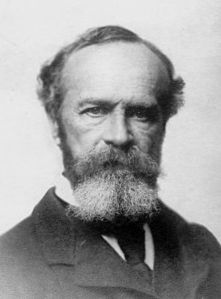“This thoroughly ‘pragmatic’ view of religion has usually been taken as a matter of course by common men. They have interpolated divine miracles into the field of nature, they have built a heaven out beyond the grave. It is only transcendentalist metaphysicians who think that, without adding any concrete details to Nature, or subtracting any, but by simply calling it the expression of absolute spirit, you make it more divine just as it stands. I believe the pragmatic way of taking religion to be the deeper way. It gives it body as well as soul, it makes it claim, as everything real must claim, some characteristic realm of fact as its very own. What the more characteristically divine facts are, apart from the actual inflow of energy in the faith-state and the prayer-state, I know not. But the over-belief on which I am ready to make my personal venture is that they exist. The whole drift of my education goes to persuade me that the world of our present consciousness is only one out of many worlds of consciousness that exist, and that those other worlds must contain experiences which have a meaning for our life also; and that although in the main their experiences and those of this world keep discrete, yet the two become continuous at certain points, and higher energies filter in. By being faithful in my poor measure to this over-belief, I seem to myself to keep more sane and true. I can, of course, put myself into the sectarian scientist’s attitude, and imagine vividly that the world of sensations and scientific laws and objects may be all. But whenever I do this, I hear that inward monitor of which W. K. Clifford once wrote, whispering the word ‘bosh!’ Humbug is humbug, even though it bear the scientific name, and the total expression of human experience, as I view it objectively, invincibly urges me beyond the narrow ‘scientific’ bounds. Assuredly, the real world is of a different temperament — more intricately built than physical science allows. So my objective and my subjective conscience both hold me to the over-belief which I express. Who knows whether the faithfulness of individuals here below to their own poor over-beliefs may not actually help God in turn to be more effectively faithful to his own greater tasks?” — William James, The Varieties of Religious Experience
-
Subscribe
Subscribed
Already have a WordPress.com account? Log in now.
